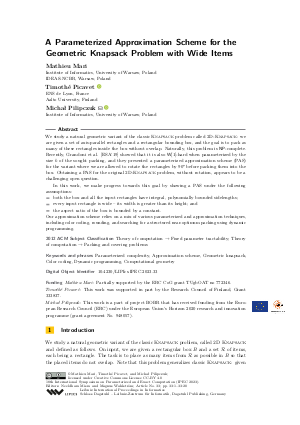A Parameterized Approximation Scheme for the Geometric Knapsack Problem with Wide Items
Authors
Mathieu Mari,
Timothé Picavet  ,
Michał Pilipczuk
,
Michał Pilipczuk 
-
Part of:
Volume:
18th International Symposium on Parameterized and Exact Computation (IPEC 2023)
Part of: Series: Leibniz International Proceedings in Informatics (LIPIcs)
Part of: Conference: International Symposium on Parameterized and Exact Computation (IPEC) - License:
 Creative Commons Attribution 4.0 International license
Creative Commons Attribution 4.0 International license
- Publication Date: 2023-12-13
File

PDF
LIPIcs.IPEC.2023.33.pdf
- Filesize: 1.5 MB
- 20 pages
Document Identifiers
Subject Classification
ACM Subject Classification
- Theory of computation → Fixed parameter tractability
- Theory of computation → Packing and covering problems
Keywords
- Parameterized complexity
- Approximation scheme
- Geometric knapsack
- Color coding
- Dynamic programming
- Computational geometry
Metrics
- Access Statistics
-
Total Accesses (updated on a weekly basis)
0PDF Downloads0Metadata Views
Abstract
We study a natural geometric variant of the classic Knapsack problem called 2D-Knapsack: we are given a set of axis-parallel rectangles and a rectangular bounding box, and the goal is to pack as many of these rectangles inside the box without overlap. Naturally, this problem is NP-complete. Recently, Grandoni et al. [ESA'19] showed that it is also 𝖶[1]-hard when parameterized by the size k of the sought packing, and they presented a parameterized approximation scheme (PAS) for the variant where we are allowed to rotate the rectangles by 90° before packing them into the box. Obtaining a PAS for the original 2D-Knapsack problem, without rotation, appears to be a challenging open question. In this work, we make progress towards this goal by showing a PAS under the following assumptions: - both the box and all the input rectangles have integral, polynomially bounded sidelengths; - every input rectangle is wide - its width is greater than its height; and - the aspect ratio of the box is bounded by a constant. Our approximation scheme relies on a mix of various parameterized and approximation techniques, including color coding, rounding, and searching for a structured near-optimum packing using dynamic programming.
Cite As Get BibTex
Mathieu Mari, Timothé Picavet, and Michał Pilipczuk. A Parameterized Approximation Scheme for the Geometric Knapsack Problem with Wide Items. In 18th International Symposium on Parameterized and Exact Computation (IPEC 2023). Leibniz International Proceedings in Informatics (LIPIcs), Volume 285, pp. 33:1-33:20, Schloss Dagstuhl – Leibniz-Zentrum für Informatik (2023)
https://doi.org/10.4230/LIPIcs.IPEC.2023.33
BibTex
@InProceedings{mari_et_al:LIPIcs.IPEC.2023.33,
author = {Mari, Mathieu and Picavet, Timoth\'{e} and Pilipczuk, Micha{\l}},
title = {{A Parameterized Approximation Scheme for the Geometric Knapsack Problem with Wide Items}},
booktitle = {18th International Symposium on Parameterized and Exact Computation (IPEC 2023)},
pages = {33:1--33:20},
series = {Leibniz International Proceedings in Informatics (LIPIcs)},
ISBN = {978-3-95977-305-8},
ISSN = {1868-8969},
year = {2023},
volume = {285},
editor = {Misra, Neeldhara and Wahlstr\"{o}m, Magnus},
publisher = {Schloss Dagstuhl -- Leibniz-Zentrum f{\"u}r Informatik},
address = {Dagstuhl, Germany},
URL = {https://drops.dagstuhl.de/entities/document/10.4230/LIPIcs.IPEC.2023.33},
URN = {urn:nbn:de:0030-drops-194529},
doi = {10.4230/LIPIcs.IPEC.2023.33},
annote = {Keywords: Parameterized complexity, Approximation scheme, Geometric knapsack, Color coding, Dynamic programming, Computational geometry}
}
Author Details
Funding
- Mari, Mathieu: Partially supported by the ERC CoG grant TUgbOAT no 772346.
- Picavet, Timothé: This work was supported in part by the Research Council of Finland, Grant 333837.
- Pilipczuk, Michał: This work is a part of project BOBR that has received funding from the European Research Council (ERC) under the European Union’s Horizon 2020 research and innovation programme (grant agreement No. 948057).
References
- Anna Adamaszek and Andreas Wiese. A quasi-PTAS for the two-dimensional geometric knapsack problem. In Proceedings of the Twenty-Sixth Annual ACM-SIAM Symposium on Discrete Algorithms, SODA 2015, pages 1491-1505. SIAM, 2015. URL: https://doi.org/10.1137/1.9781611973730.98.
- Hsien-Chih Chang, Jeff Erickson, and Chao Xu. Detecting weakly simple polygons. In Proceedings of the Twenty-Sixth Annual ACM-SIAM Symposium on Discrete Algorithms, SODA 2015, pages 1655-1670. SIAM, 2015. URL: https://doi.org/10.1137/1.9781611973730.110.
-
Erik D Demaine and Joseph O'Rourke. Geometric folding algorithms: linkages, origami, polyhedra. Cambridge university press, 2007.

-
Manfredo P Do Carmo. Differential geometry of curves and surfaces: revised and updated second edition. Courier Dover Publications, 2016.

- Waldo Gálvez, Fabrizio Grandoni, Salvatore Ingala, Sandy Heydrich, Arindam Khan, and Andreas Wiese. Approximating geometric knapsack via L-packings. ACM Trans. Algorithms, 17(4), 2021. URL: https://doi.org/10.1145/3473713.
- Waldo Gálvez, Fabrizio Grandoni, Arindam Khan, Diego Ramírez-Romero, and Andreas Wiese. Improved approximation algorithms for 2-Dimensional Knapsack: Packing into multiple L-shapes, spirals, and more. In 37th International Symposium on Computational Geometry, SoCG 2021, volume 189 of LIPIcs, pages 39:1-39:17. Schloss Dagstuhl - Leibniz-Zentrum für Informatik, 2021. URL: https://doi.org/10.4230/LIPIcs.SoCG.2021.39.
- Fabrizio Grandoni, Stefan Kratsch, and Andreas Wiese. Parameterized approximation schemes for Independent Set of Rectangles and Geometric Knapsack. In 27th Annual European Symposium on Algorithms, ESA 2019, volume 144 of LIPIcs, pages 53:1-53:16. Schloss Dagstuhl - Leibniz-Zentrum für Informatik, 2019. URL: https://doi.org/10.4230/LIPIcs.ESA.2019.53.
- Klaus Jansen and Guochuan Zhang. On rectangle packing: maximizing benefits. In Proceedings of the Fifteenth Annual ACM-SIAM Symposium on Discrete Algorithms, SODA 2004, pages 204-213. SIAM, 2004. URL: http://dl.acm.org/citation.cfm?id=982792.982822.
-
Yoshiyuki Kusakari, Hitoshi Suzuki, and Takao Nishizeki. A shortest pair of paths on the plane with obstacles and crossing areas. International Journal of Computational Geometry & Applications, 9(02):151-170, 1999.

- Joseph Y.-T. Leung, Tommy W. Tam, C. S. Wong, Gilbert H. Young, and Francis Y. L. Chin. Packing squares into a square. J. Parallel Distributed Comput., 10(3):271-275, 1990. URL: https://doi.org/10.1016/0743-7315(90)90019-L.
-
Moni Naor, Leonard J Schulman, and Aravind Srinivasan. Splitters and near-optimal derandomization. In Proceedings of IEEE 36th Annual Foundations of Computer Science, pages 182-191. IEEE, 1995.

